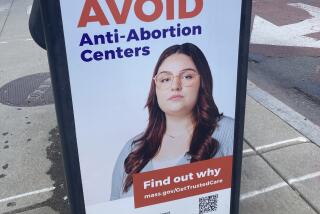Court Shoots Down Policy to Deny Risky Job to Fertile Woman : Litigation: Fetal-protection policy discriminates on basis of ‘unscientific stereotypic notions of women’ appeals court says.
- Share via
SANTA ANA — A company’s policy that denied a woman a job on the grounds that working conditions could endanger any children she might have is discriminatory, a state Court of Appeal has ruled.
In a unanimous decision handed down Wednesday, the 4th District Court of Appeal ruled that a “fetal-protection policy” at a Johnson Controls Inc. plant in Fullerton assumes that all fertile women would become pregnant.
The policy bars women who are capable of bearing children from working on assembly lines where the air has a high lead content.
“It discriminates on the basis of unfounded, unscientific stereotypic notions of women,” Associate Justice Robert O. Staniforth wrote in the appellate court’s opinion. “The company’s policy is to exclude women, not because they are pregnant but because they are fertile.
“This is not discrimination based on ‘objective differences’ between men and women. It is discrimination based on categorical, long-ago discarded assumptions about the ability of women to make reasoned, informed choices,” Staniforth wrote.
Patricia Shiu, the attorney for the woman in the case, Queen E. Foster of Anaheim Hills, predicted the court’s decision will have an impact not just in California but all around the country.
“This is the first and only complete analysis of a fetal conception working-place policy,” she said. Courts in other states will review this decision when similar cases arise, she said.
Foster, 35, who now works at Southland Corp. in Fountain Valley, said of the decision: “I think it’s terrific. Maybe we can get somewhere these days.”
Jim Cox, manager at Johnson Controls, a Milwaukee-based company that manufactures automotive batteries, said that the company would probably ask the state Supreme Court to review the case.
The company had contended that its policy was directed at protecting unborn children, claiming that medical research shows that a fetus must be protected from much lower levels of lead than adults. The company argued that many pregnancies are unplanned, and that a woman might work in a hazardous area before realizing that she is pregnant. The company noted that lead residue remains in the body after the exposure has ended.
But civil rights activists claimed that the company’s policy violates the rights of women by barring them from higher-paying, heavy industrial jobs that historically have been held by men.
The dispute has also pitted the rights of California women to work where they wish against policies intended to protect the health of unborn children, Shiu said.
Foster said women should have the right to decide whether to work in a potentially dangerous environment.
In 1983, Foster applied for a job at Johnson Controls that would have paid $9 an hour operating a machine that assembles batteries. At the time, she was making $5 an hour doing clerical work for another company.
“I’m single in California,” Foster said in an interview. “I needed a job that supported my life.”
Even though Foster told Johnson Controls that she had no intention of becoming pregnant, the company told her she would not be hired unless she provided medical documentation that she was sterile, according to court records.
Foster filed a complaint with the state Fair Employment and Housing Commission, which ruled in 1987 that the policy constituted illegal discrimination based on sex and ordered the company to “cease and desist” from implementing its fetal-protection policy, hire Foster and award her $16,000 in back pay.
The company then filed suit against the commission.
In January, 1988, an Orange County Superior Court Judge William McDonald overturned the commission’s ruling. The commission and the Legal Aid Society of San Francisco, on behalf of Foster, appealed the ruling to the 4th District Court of Appeal.
According to company officials, Johnson Controls adopted the so-called fetal-protection policy in 1982 out of concern that exposure to high levels of lead could cause birth defects.
The Fair Employment and Housing Commission, however, pointed out medical data that suggest exposure to lead could affect men also, either by reducing the number of sperm they produce or causing abnormalities in the shape of the sperm. The Court of Appeal agreed with the commission’s findings.
“There is no evidence that fertile women cannot efficiently perform jobs involving contact with lead at the company’s facilities,” the court’s decision stated. “Although some women have become pregnant while working there, thus creating the possibility of harm while working there, this fact falls far short of a showing that ‘all or substantially all’ female workers would create such a risk.”
Last fall, the U.S. 7th Circuit Court of Appeals in Chicago ruled 7-4 in favor of Johnson Controls in a case brought by the United Auto Workers, which represents rank-and-file employees at the company’s Milwaukee plant.
The court ruled that the fetal-protection policy was “reasonably necessary to the industrial safety-based concern of protecting the unborn child from lead exposure.” It also accepted the company’s argument that it was protecting itself from potential lawsuits.
The UAW has since asked the U.S. Supreme Court to review the case.
In Wednesday’s decision, the state Court of Appeal refused to follow the federal court ruling.
Meanwhile, Foster said that she has every intention of starting work at the Johnson Controls plant, pending its next legal action.
More to Read
Inside the business of entertainment
The Wide Shot brings you news, analysis and insights on everything from streaming wars to production — and what it all means for the future.
You may occasionally receive promotional content from the Los Angeles Times.










